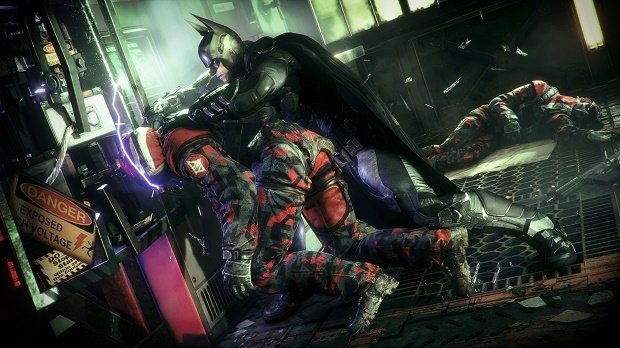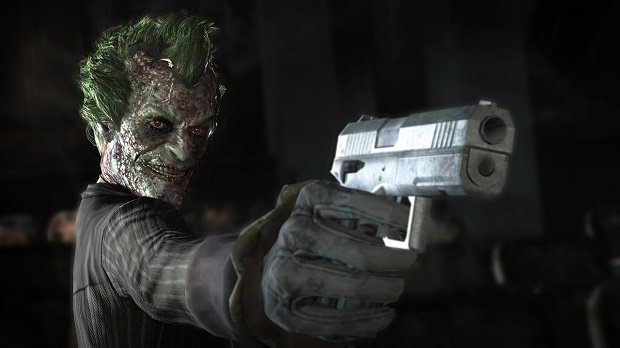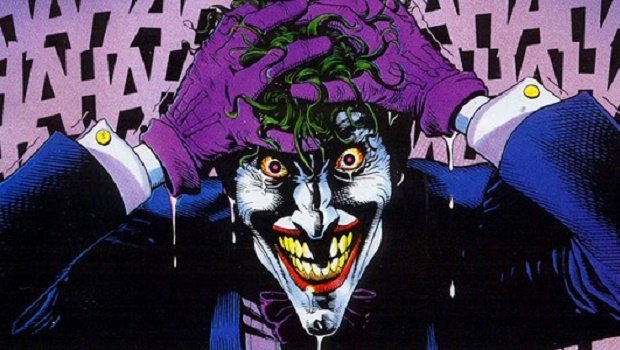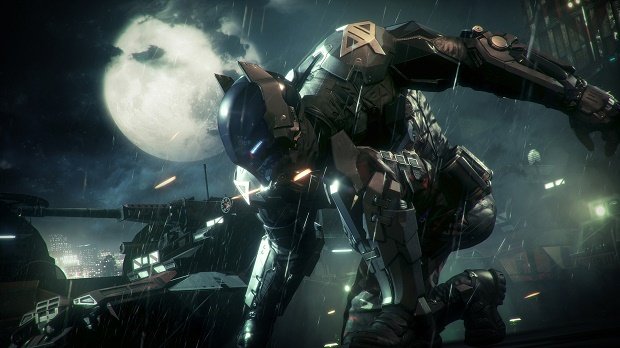Batman's T-rating has been holding him back
Everyone knows Batman doesn't kill people. It's part of what makes him a shining beacon in the darkness of Gotham City. The problem is that everyone else around him is fucking unhinged. The menagerie of super-villains and psychopaths that haunt the city aren't afraid to use the people that Batman loves, unfortunate police officers and guards, and innocent bystanders as their own personal punching bags. As such, learning that Arkham Knight is getting an M-rating has me incredibly excited about the possibilities of the final chapter of Rocksteady's stellar saga.
I'm going to come right out and say it: Arkham Asylum and its sequel, Arkham City, should have been rated M. While the recent Batman games use the animated series as a base, their tone is far more in line with the more disturbing, more unpleasantly vicious side of Gotham, often seen in the darker, more adult comics. Asylum opens with The Joker brutally choking a guard to death, and swiftly moves through a carnival of terror. Arkham City is even more sinister, opening up that sense of dread to fill an entire city. I mean, hell, even The Riddler, a character once played by Jim Carrey, kidnaps a bunch of political prisoners and straps them into Rube Goldbergian murder devices. If Arkham Asylum is the color black, then Arkham City is like… a darker black (I'm terrible with metaphors). But as menacing as these games are, their Teen rating feels like a barrier holding them back from their full potential.

What makes the comics compelling is the notion that Batman is so dangerously close to becoming the monster his enemies want him to be. He knows he's capable of inflicting just as much terror as the adversaries he faces, so he forces himself to stick to very strict rules. It's why he doesn't kill. It's why he sticks to the shadows. His enemies know this, and they constantly try to poke the bear, seeing how far they can go to get him to snap.
And sometimes, he does. Batman, like most humans, is imperfect, and he knows how close he is to teetering off that cliff and falling into the abyss. Batman is almost Shakespearean in that regard, a tragic figure trying to keep his head above water while everything is sinking around him. So when Batman snaps Joker's neck, spits in his face, but doesn't actually kill him in The Dark Knight Returns, we know that, while there's a certain line he won't cross, he has no problem inching right up next to it. Just because Bats doesn't kill people, doesn't mean he isn't capable of some truly heinous acts of violence.
With a T-rating, Asylum and City have danced up next to these themes like the devil in the pale moonlight, but they've never fully committed to them. They might be bleak, gloomy affairs, but then again, they also feature scenes where the Joker hulks out and turns into a giant mutant, and where Batman punches a shark in the face. Moments like these are incredibly silly, and they fly in the face of the gritty, more realistic tone of the rest of the games.

But it's not just those goofy moments that have held the series back. Even the animated series, as kid-friendly as it is, has the confidence to take familiar, gritter, more emotional Batman tropes and expand on them. The games, however, present these tropes on a surface level and don't really do anything with them. Joker and Bats have great chemistry in their persistent back-and-forth, but their relationship goes unchanged over two whole games. There's tension between Batman and Robin in Arkham City, but it goes nowhere, almost comically so. The Arkham games' treatment of the Caped Crusader is all surface and no depth, simply trotting out a rogues gallery of villains to fight and sidekicks to wave off, without actually saying anything that hasn't been explored more deeply in countless comics, films, and cartoons. And there's more to the brutality of Batman's world than simply punching a thug square in the jaw in slow-motion, or watching his foes kick someone into an electrified puddle.
Take comics like The Killing Joke. It's definitely controversial in how brutally it treats Barbara Gordon, but it shows how far Batman's adversaries will go to break him and what he holds dear. The Joker doesn't just attack her; he tortures her, humiliates her, even paralyzes her. His only goal? To fuck with Commissioner Gordon. Because he can. These aren't normal, garden variety criminals. These are people hell-bent on destroying the Batman at all costs, no matter who gets killed or what gets destroyed along the way.
Weekly digests, tales from the communities you love, and more

And this isn't just a one-off moment. This kind of stuff happens all the time in Gotham City. In Grant Morrison's Arkham Asylum, The Joker threatens to blind a staff member in order to lure Batman to the facility, then sends the Caped Crusader on a Lynchian nightmare into psychological terror. In A Death in the Family, the Joker flat out murders Robin. Cassandra Cain (who would later go on to become Batgirl) was conditioned and dehumanised from childhood to become the perfect assassin, and was complete wreck until Bruce Wayne took her in and trained her. These searing atrocities don't happen in every single story, but when they do, they're impactful. They show that the events that occur in Batman's world have horrific, far-reaching consequences, that it's not just enough to kill someone. No, true loss in Gotham City comes from a completely and utterly broken will.
The Arkham series barely touched on these themes, instead opting for the more typical gruff, untouchable savior many AAA games feature these days. There are hints of the struggle Batman undergoes, slight glimpses of Batman's dark side, but he still remains the moral compass in a world filled with evil magnets. We know that whatever nasty stuff Joker throws his way, T-rated Batman is still going to get out relatively unscathed, even if his cape is in tatters.
The Arkham games just don't go far enough. Sure, stuff blows up, people die, and so on, but there aren't any real stakes. The Joker's a real ass, but T-rated Batman isn't going snap his neck. Because of Rocksteady's previous reluctance to make its version of The Dark Knight anything more than a video game hero, he remains stoic and unflinching in his resolve while everyone around him continues to try and knock him off his pedestal. Every time the games threaten to focus more on the the really gritty, human moments that the comics are known for, they only go so far before swinging right back into action film territory.

But with an M-rating, all bets are off. An M-rated Batman game can chew him up and spit him out. An M-rated Batman game can push him to the point where he willing to break someone's back (without killing them, of course). That's surely the exciting thing about this being the final part of the Arkham arc. As a cumulative, grand finale, we have the chance to see how close Batman is going to tip toe to the brink without going over, how the the events of the previous games have weighed upon him and pushed him. That impact is going to be significantly lessened by a gung-ho, unflappable, T-rated superhero. The games haven't shown us how far Batman can go or just how closely he can match the depravity of the so-called villains he's supposed to stop, or how doing so will affect him. With the M-rating, Rocksteady is (hopefully) finally fully committing to the dark tone that it played with over the previous two games. This final episode of the saga might just be the one to break the bat, or come perilously close to doing so.
So yes, bring on the Mature rating. Bring on the villains and the brooding melodrama. Ground the series in bleak, existential realism, put Batman through the wringer, and let's see what comes out the other side. The comics have been doing it for years. It's time for the games to do one better.



